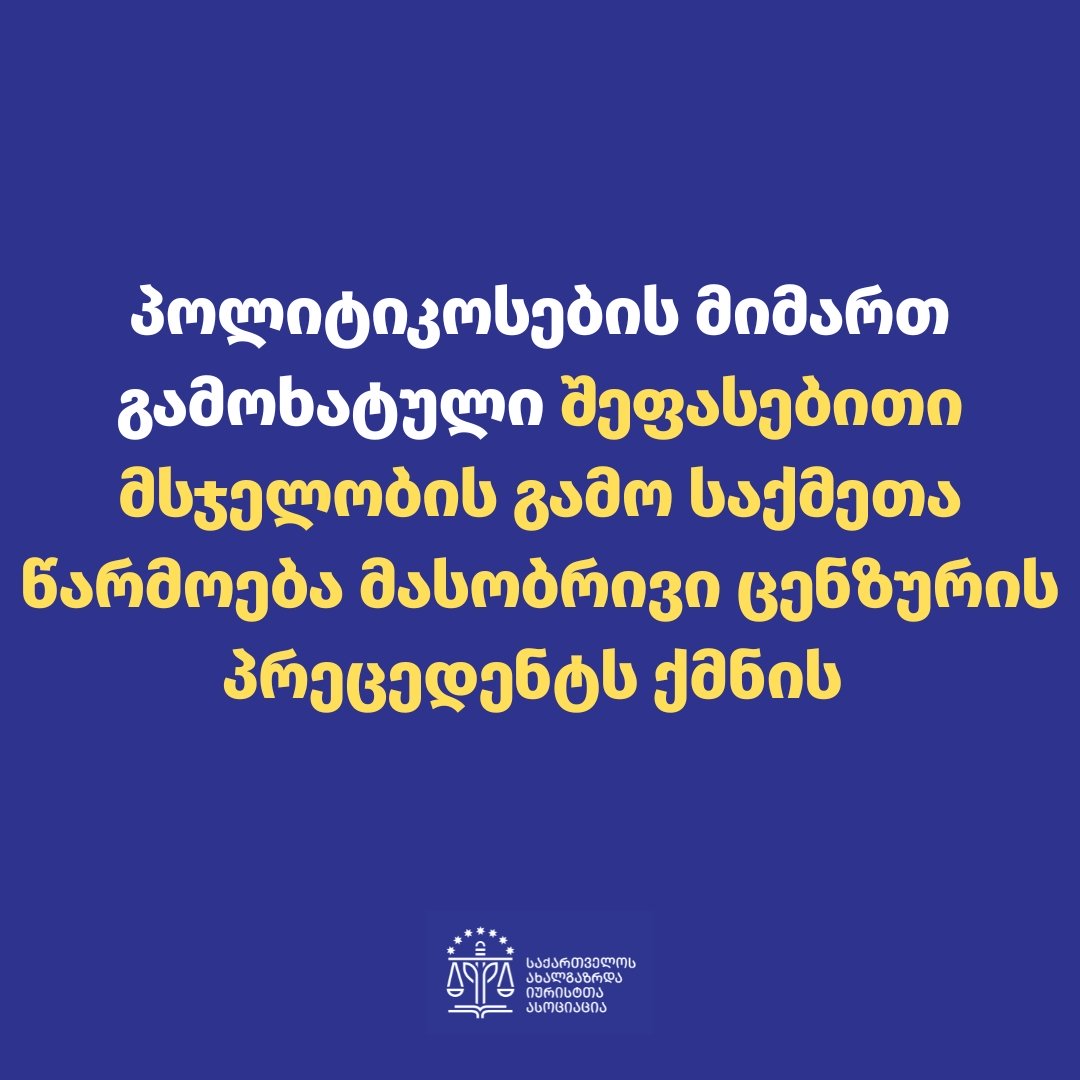NEWS

On 6 June, the Georgian Dream filed a complaint with the Ministry of Internal Affairs regarding opinions expressed by citizens, activists, journalists, and politicians on social networks. The legal basis for these complaints is the newly enacted Article 173¹⁶ of the Code of Administrative Offenses, which provides for liability for actions such as verbal insults, swearing, or other offensive behavior directed at a state-political official, political official, state servant/person equated with them, and/or public servant during or in connection with the performance of their official duties. This offense is punishable by a fine of 1,500 to 4,000 GEL or up to 45 days in prison. Based on these complaints, citizens began receiving court summonses starting 11 June 2025. 1
According to GYLA, this constitutes an unjustified restriction on freedom of expression, creates a chilling effect, and aims to instill fear in society to prevent people from critically evaluating the actions of the Georgian Dream and its politicians.
Freedom of expression obliges the state to refrain from arbitrary interference and to ensure the possibility of a free exchange of ideas and opinions. It also imposes positive obligations on the state to create an environment conducive to public debate, enabling all interested parties to express their views without fear—even when such views may be offensive or shocking to public officials. Furthermore, the European Court of Human Rights has consistently held that the permissible scope of criticism is broader for public figures than for private individuals. 2 Therefore, politicians and representatives of state institutions have a significantly higher duty to tolerate criticism than ordinary citizens. 3 This standard also applies to other public figures—individuals who, through their actions or public presence, are in the public eye. 4 The Court has also made it clear that neither politicians nor public institutions are entitled to enhanced protection from insults or ridicule. 5
Posts on social networks, as long as they do not contain real threats and are directed at politicians with a high obligation of tolerance, are protected under freedom of expression. Any judicial interpretation to the contrary sets a dangerous precedent for mass censorship.
In addition to the justice system being used as a punitive tool against freedom of expression, the selective application of justice is also notable. During the April–May 2024 protests against the “Russian law,” it was publicly known that activists, human rights defenders, journalists, and even their family members received anonymous phone calls filled with threats and insults due to their participation in the protests. These threats were real and, in several cases, carried out. A publicly released statement and video on 31 May 2024 clearly identified Georgian Dream MP Dito Samkharadze as one of the individuals involved in the organized persecution of civil society organizations and other opponents of the “Russian law.” This persecution included the targeting of specific groups and the use of various repressive tactics (e.g., phone calls, property damage).6 Despite this, no legal action was taken in response.
1 ჟურნალისტები და აქტივისტები ამბობენ, რომელი “ფეისბუქ” პოსტების გამო იბარებს “ოცნება” მათ სასამართლოში, netgazeti. 11.06.24. https://netgazeti.ge/news/776675/?fbclid=IwY2xjawK2vyBleHRuA2FlbQIxMABicmlkETExdlhMeWJzVnBUNVhXdlZKAR7ymEaUEHOnEyqp48AxynCSbVRZ6ng3okoaOXSI9RATkgOshrW41CuT6VDYjA_aem_WewGpujX0JVYfQ-78fXTZQ , იხილეთ ასევე: ფრაქცია ქართული ოცნება სიციალურ ქსელებში გამოქვეყნებული პოსტების გამო მოქალაქეებს უჩივის, ფორმულა, 06.06.2025, https://formulanews.ge/News/126491?fbclid=IwY2xjawK2wqhleHRuA2FlbQIxMQABHp8TwU5UNpVI4li0GNh5aRLGWmmirzjGwZ-w-Q9zHVS9IbfK0zpIWgbXjiLL_aem_A44B-herxWqwYWqqBucJQQ
2 Handyside V. The United Kingdom, (Application No. 5493/72), ECHR, 1976 Dink c. Turquie, (App. nos 2668/07, 6102/08, 30079/08, 7072/09 et 7124/09), 2010.
3 Lacroix V. France, (App. No. 41519/12), ECHR, 2017.
4 Case Of Drousiotis V. Cyprus, (Application No. 42315/15), Echr 2022
5 Case Of Savva Terentyev V. Russia, (Application No. 10692/09), ECHR, 2018
6 იხ: საია - ს ანგარიში „საქართველო: ადამიანის უფლებები რუსული კანონის პირისპირ” 2024, გვ.19
SHARE: